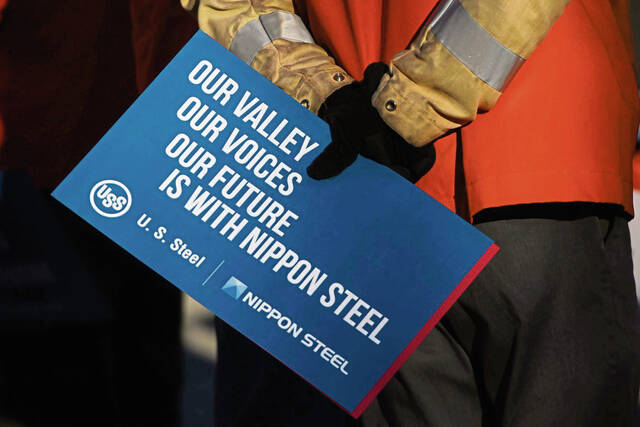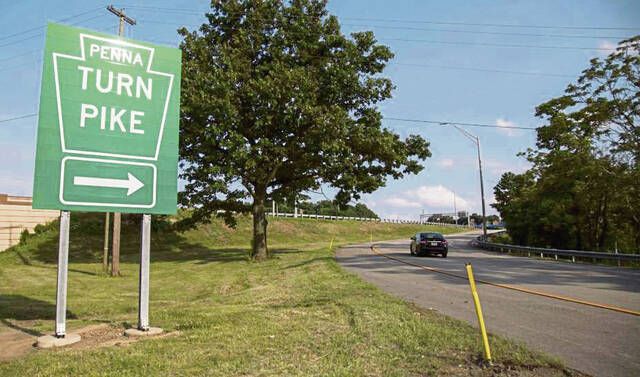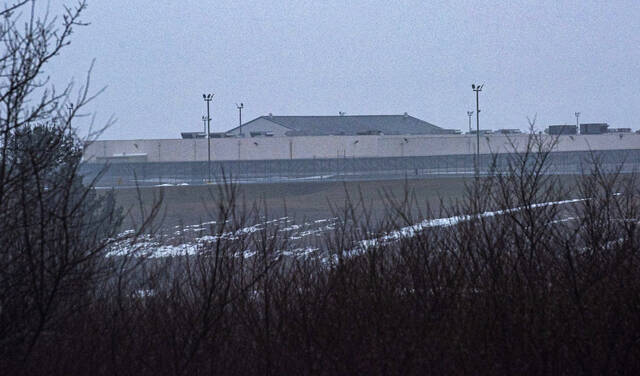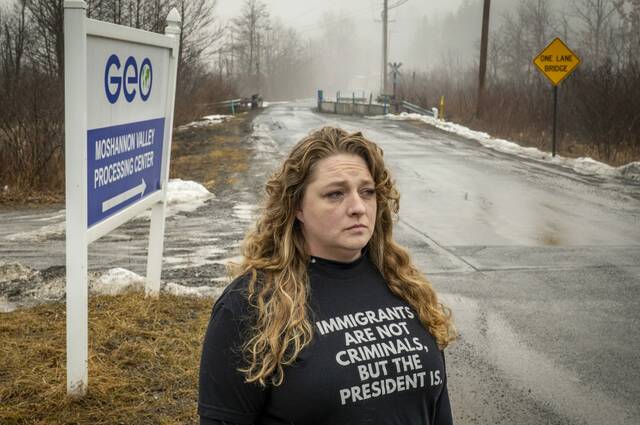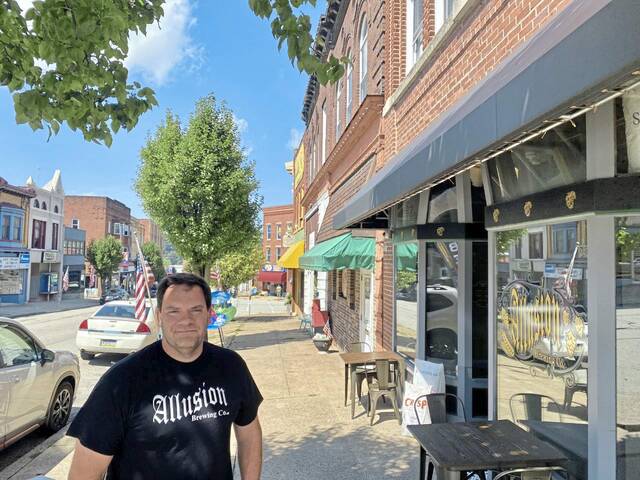Three Mon Valley mayors remember it well: A series of mid-December meetings with union leaders and Nippon Steel executives as Japan’s largest steelmaker aggressively courted U.S. Steel, the storied American manufacturer.
Relations between the United Steelworkers union and Nippon — never friendly, exactly — had deteriorated over the course of the year during the Japanese company’s pursuit. The union railed against Nippon to anyone who would listen, and the firm privately grew frustrated with this perceived refusal to give its proposed multibillion-dollar buyout a fair shake.
In December, a brief glimmer of hope emerged that all sides might find a merger acceptable.
Then, at the last of those meetings, something shifted in David McCall, president of United Steelworkers International, which represents 850,000 members and retirees.
“McCall’s attitude totally changed,” recalled West Mifflin Mayor Chris Kelly. As far as McCall was concerned, the deal was a nonstarter.
“This deal clearly jeopardizes our long-term future, and we must continue to resist it,” McCall and Mike Millsap, the union negotiating committee chairman, wrote in a letter to members.
For many close to the negotiations, this opposition was hardly the deal-killer it once threatened to be.
“At that point in time, I knew it was going to get done,” said Clairton Mayor Rich Lattanzi, who was at the table with Kelly and North Braddock Mayor Cletus Lee. “It was just a matter of how much fight or how much pushback.”
Though then-President Joe Biden would block the deal on national security grounds in January, Donald Trump and his “Art of the Deal” ethos were poised to return to the White House.
What’s more, a significant number of rank-and-file workers had broken from union leadership on the issue, and proponents of the deal had found influential allies in a contingent of politicians, including Republicans such as state Sen. Kim Ward of Hempfield and U.S. Rep. Dan Meuser of Schuylkill County.
The saga finally came to a close Wednesday after the companies announced a $14.9 billion merger as well as a national security agreement meant to mitigate concerns about a foreign company controlling a domestic steelmaker.
A “golden share” held by the U.S. government can stop Nippon from closing U.S. Steel plants, offshoring jobs or moving the headquarters from Pittsburgh, among other major business decisions.
Getting to this point took a year and a half. Along the way, loyalties frayed, strange alliances formed and uncertainty reigned supreme.
When U.S. Steel and Nippon first announced their plans to link up in December 2023, few could imagine there would be so much drama.
Enter Nippon
In August 2023, U.S. Steel rejected a $7.3 billion buyout offer from rival Cleveland-Cliffs, despite the Ohio-based steelmaker having the support of the United Steelworkers.
When Nippon followed up with a more lucrative offer of its own, union leadership staked out a position from which they never really wavered — vehement opposition to the deal.
There were promises early on from Nippon, such as a $1.4 billion investment pledge and promises of no layoffs at least through September 2026, when the current union contract expires. But a lot of workers were spooked.
“I was nervous for the fate of my pension because I had 27 years tied up there,” said Mike Evanovich, the former president of United Steelworkers Local 1219, representing the Edgar Thomson Works in Braddock and North Braddock. “If they would take that money … and take it to Japan, I don’t know if there’s an international law to bring it back here.”
That fear partly led Evanovich to leave the company in May 2024.
Nippon remained determined to earn the trust of workers.
Its $1.4 billion pledge was nearly doubled to $2.7 billion in August. By May, it had swelled to $14 billion for major plant upgrades and a new facility at a location yet to be determined.
Even knowing what he knows now — that the U.S. government can block Nippon from reneging on $11 billion of these investments — Evanovich said he still wouldn’t be comfortable working under the Japanese company.
Plenty of his colleagues came around to the idea, though.
In September, a sea of orange U.S. Steel jackets filled the courtyard outside the company’s namesake tower in Downtown Pittsburgh to rally in support of the deal. A similar, well-attended event took place at the Clairton Coke Works in December.
Employees said at the time support for the deal at their plants ranged from 50% to 90%.
Election-year drama
With Nippon being a Japanese company, the sale became subject to review for national security risks. That meant the federal government, and ultimately Biden, could get a say on whether a major employer in a politically vital state during an election year would be sold.
In March 2024, Biden declared U.S. Steel must remain American-owned, suggesting Nippon’s effort was doomed. Trump staked out that same position a couple of months earlier.
A trio of Pennsylvania Democrats — U.S. Rep. Chris Deluzio of Fox Chapel, U.S. Sen. John Fetterman and then-Sen. Bob Casey — would all go on to express doubt. Advocates at the state or federal level were practically nonexistent.
“The problem was, on the surface, this deal sounded un-American,” said Paul Sracic, an adjunct fellow at the Hudson Institute with expertise in U.S.-Japan relations. “It’s the sort of thing you can imagine working-class voters being viscerally against.”
In the background, for several months leading up to and after the election, the Committee on Foreign Investment in the United States was analyzing the proposed corporate marriage for national security risks. The panel sees tens of thousands of transactions a year and takes in-depth looks at several hundred, according to Stephen Heifetz, a lawyer at Wilson Sonsini and former U.S. national security official.
Only a few ever make it to the president’s desk, but Biden wanted a report. The recommendation was split, and Biden went ahead with blocking the deal in January, weeks before Trump returned to the White House.
Trump’s flip-flop
Trump opposed U.S. Steel and Nippon merging — until he didn’t.
In February, during a news conference with Japanese Prime Minister Shigeru Ishiba, Trump said Nippon would invest in U.S. Steel instead of buying it outright.
“That really sent the signal for the parties to come in and restructure the deal,” said Chester Spatt, a finance professor at Carnegie Mellon University who has followed closely the U.S. Steel-Nippon saga.
Then, in April, Trump ordered a second national security review, essentially throwing out all the analysis done under the Biden administration.
The sale saga will have several lasting legacies, among them the further politicization of the Committee on Foreign Investment in the United States, Heifetz said.
The report landed on Trump’s desk in late May. Shortly after, the president took to social media to announce a “planned partnership” between U.S. Steel and Nippon. The post was short on details.
It was only Wednesday that the companies confirmed the partnership does, in fact, refer to a merger plus a national security agreement.
For the first time in a while, it’s possible to know what’s next for the Mon Valley’s most crucial employer.
“It was like being on a roller coaster for two years,” said Kelly, the West Mifflin mayor. “Like you’re at Kennywood.”


